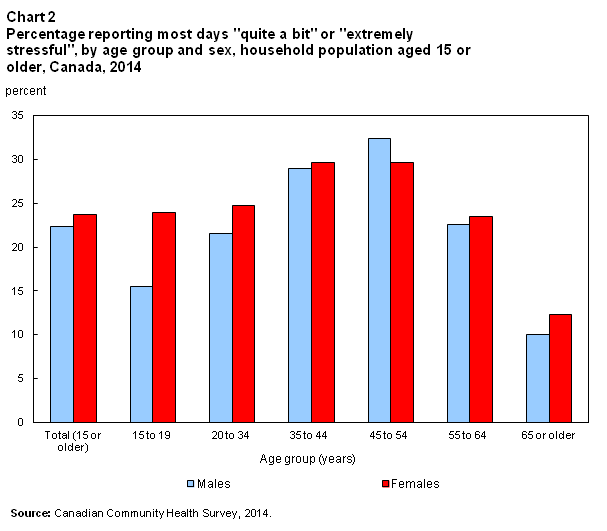Nowadays, it is very common to hear phrases like “I’m stressed out ” or “I don’t know if I can handle the stress”. However, the prevalence of stress in our society should not be accepted due to the negative impact that stress can have on people’s health.
Stress is an organism’s response to any environmental or physical factor that is perceived as threatening harm ,

Pathway for Cortisol release in response to stress. Source: Top 10 Home Remedies
where the body experiences biochemical changes such as the release of hormones to prepare the system to confront danger or avoid it . Although, some amount of stress can be expected in any healthy individual, prolonged stress has become a damaging condition in modern environment.
According to Statistics Canada, in 2014 about 73% of adults between 20 and 64-years-old suffer from some level of stress. These findings, are indicative of increasing stress levels that could have long-term consequences on people’s health.

Source: Canadian Community Health Survey, 2014.
In 2014, 23% of Canadians reported that most days were “quite a bit” or “extremely stressful”. Additionally, females were more likely to report that most days were “quite a bit” or “extremely stressful”
According to the review Human behaviour: A cooperative instinct , stress in small doses enables people to adapt faster to unexpected changes in environmental conditions. Likewise, the presence of danger triggers a response called “fight-or-flight” where the body defenses increases: adrenalin secretion increases, blood flow to the brain and muscles increases. Nevertheless, the experience of being overwhelmed and in constant stress causes damage to health, decrease in productivity and life quality.
What is the link between stress and the immune system?
According to the article published by GM Lewitus and M Schwartz, cells from the immune and nervous system interact together during stress episodes to secrete memory cells that will help people cope with stress-situations in the future. In other words, this mechanism is used by your body to protect you from possible danger.
What are the causes of stress?
When encountering a stressful situation, cortisol is released, it maintains bodily functions consistent. However, when stress is present for an extended period of time, high levels of cortisol inhibit some immune responses causing more susceptibility to infections and does not control properly inflammatory responses.
What are the effects of stress?
Some of the effects include: problems with the digestive and reproductive systems, increase the risk of heart attack and stroke. In addition, a review article shows that stress can even rewire the brain, leaving people more vulnerable to anxiety, depression, and other mental health problems.
The skin condition know as psoriasis appears to be linked to constant stress periods rather than medication or diet reasons. Researchers suggest that psoriasis is caused by the regulation of cortisol becoming dysfunctional leading to poor control of inflammatory responses causing this condition.
Therefore, being aware of the negative consequences that stress has on people’s health, will allow to reduce its prevalence in society.

Effects of stress on the body Source: Live Love Fruit.
Mariana Paspuel

One response to “Stress Not…”